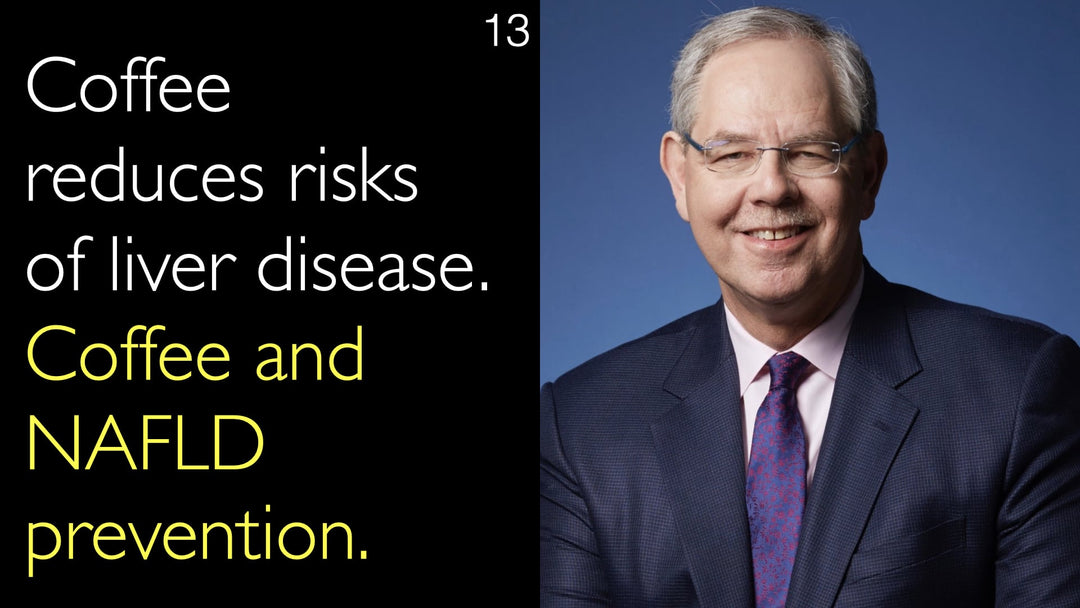Dr. Scott Friedman, MD, ein führender Experte für Lebererkrankungen, erklärt, wie Kaffeekonsum das Risiko für Lebererkrankungen senken kann. Er verweist auf überzeugende epidemiologische Daten, die eine schützende Wirkung bei regelmäßigem Kaffeegenuss belegen. Dr. Friedman betont, dass der Nutzen wahrscheinlich nicht auf Koffein, sondern auf einer anderen Komponente beruht. Bis zu drei Tassen täglich können seiner Einschätzung nach Teil einer leberfreundlichen Ernährung sein. Dennoch warnt er: Kaffee ist kein Heilmittel, und Patienten sollten weiterhin ärztliche Behandlung in Anspruch nehmen.
Kaffeekonsum und Prävention von Lebererkrankungen: Wirkmechanismen und Vorteile
Direkt zum Abschnitt
- Kaffee und Risikoreduktion bei Lebererkrankungen
- Epidemiologische Evidenz für Kaffee
- Aktive Komponente in Kaffee
- Klinische Empfehlungen zum Kaffeekonsum
- Kaffee als Ergänzung, nicht als Heilmittel
- Vollständiges Transkript
Kaffee und Risikoreduktion bei Lebererkrankungen
Dr. Scott Friedman, MD, bestätigt, dass regelmäßiger Kaffeekonsum mit einem geringeren Risiko für Lebererkrankungen einhergeht. Diese Erkenntnis stützt sich auf eine umfassende Auswertung großer Bevölkerungsstudien. Der Zusammenhang zwischen Kaffeekonsum und verbesserter Lebergesundheit ist in der medizinischen Literatur mittlerweile gut belegt.
Dr. Scott Friedman, MD, betont, dass dies eine positive Nachricht für Kaffeetrinker ist. Der schützende Effekt ist eine konsistente Schlussfolgerung aus zahlreichen Forschungsarbeiten.
Epidemiologische Evidenz für Kaffee
Die epidemiologischen Daten, die den Nutzen von Kaffee für die Leber belegen, werden von Dr. Scott Friedman, MD, als sehr überzeugend beschrieben. Diese Studien untersuchen große Bevölkerungsgruppen über einen längeren Zeitraum und erfassen dabei sowohl den Kaffeekonsum als auch das Auftreten von Lebererkrankungen. Die Ergebnisse zeigen eine deutliche und beeindruckende Korrelation, die die Aufmerksamkeit von Hepatologen auf sich gezogen hat.
Dr. Anton Titov, MD, verweist auf eine wichtige Übersichtsarbeit zu diesem Thema, die im New England Journal of Medicine veröffentlicht wurde. Dies unterstreicht die Relevanz der Erkenntnisse innerhalb der medizinischen Gemeinschaft.
Aktive Komponente in Kaffee
Dr. Scott Friedman, MD, weist darauf hin, dass der leberschützende Effekt nicht allein auf Koffein zurückzuführen ist. Zwar wird der Nutzen eher mit koffeinhaltigem als mit entkoffeiniertem Kaffee in Verbindung gebracht, doch die genaue schützende Komponente bleibt unbekannt. Forscher arbeiten aktiv daran, die spezifische(n) Verbindung(en) im Kaffee zu identifizieren, die für die Verringerung von Leberschäden verantwortlich sind.
Dieses Rätsel verleiht der Ernährungs- und Leberstoffwechselforschung eine interessante Dimension. Das Verständnis des zugrunde liegenden Mechanismus könnte zu weiteren therapeutischen Erkenntnissen führen.
Klinische Empfehlungen zum Kaffeekonsum
Basierend auf der Evidenz gibt Dr. Scott Friedman, MD, eine angemessene klinische Empfehlung. Patienten mit Lebererkrankungen, die bereits Kaffee trinken, sollten nicht davon abgehalten werden. Für diejenigen, die keinen Kaffee trinken, ihn aber mögen, kann der Beginn des Konsums vorteilhaft sein.
Er schlägt vor, dass bis zu drei Tassen Kaffee pro Tag wahrscheinlich einen gewissen Schutz bieten. Allerdings warnt Dr. Friedman auch davor, dass Betroffene stets Rücksprache mit ihrem Arzt halten sollten, da koffeinhaltiger Kaffee den Puls erhöhen kann und nicht für jeden geeignet ist.
Kaffee als Ergänzung, nicht als Heilmittel
Dr. Scott Friedman, MD, stellt klar, dass Kaffee allein keine Lebererkrankung heilen wird. Es handelt sich um eine kleine Komponente einer gesunden Ernährung, die das Risiko von Leberschäden verringern kann. Patienten sollten nicht darauf verzichten, einen Arzt aufzusuchen, in der Annahme, dass allein das Trinken von Kaffee ausreicht.
Diese Perspektive ist entscheidend für die Aufrechterhaltung einer angemessenen medizinischen Versorgung. Dr. Anton Titov, MD, und Dr. Scott Friedman, MD, sind sich einig, dass Kaffee eine Ergänzung zu, aber kein Ersatz für eine professionelle medizinische Behandlung und gesunde Lebensstilentscheidungen ist.
Vollständiges Transkript
Dr. Anton Titov, MD: Wie beurteilen Sie die Auswirkungen von Kaffee auf den Leberstoffwechsel? Gibt es einen nennenswerten Effekt? Es gab eine Übersichtsarbeit über Kaffee im New England Journal of Medicine.
Wie ist Ihre allgemeine Einschätzung?
Dr. Scott Friedman, MD: Hier ist die gute Nachricht, die ich als leidenschaftlicher Kaffeetrinker habe: Ich kann Ihnen mitteilen, dass viele Studien große Bevölkerungsgruppen untersuchen und das Risiko von Lebererkrankungen mit dem Kaffeekonsum korrelieren. Sie sind zu der konsistenten Schlussfolgerung gelangt, dass regelmäßiger Kaffeekonsum das Risiko von Lebererkrankungen verringert.
Es ist erstaunlich, wie überzeugend die epidemiologischen Daten sind. Und es liegt nicht einfach am Koffein im Kaffee; wahrscheinlich ist es ein anderes Element. Allerdings wird der Effekt eher koffeinhaltigem als entkoffeiniertem Kaffee zugeschrieben.
Wir wissen nicht, was im Kaffee die Leber schützt. Aber es ist sicherlich eine vernünftige Empfehlung für unsere Leberpatienten: Wenn sie Kaffee trinken, sollten sie nicht davon abgehalten werden.
Bis zu drei Tassen pro Tag bieten wahrscheinlich einen gewissen Schutz. Wenn sie noch nie Kaffee getrunken haben und ihn mögen, spricht nichts dagegen, damit anzufangen, denn es gibt diese sehr beeindruckende Korrelation zwischen chronischem oder langfristigem Kaffeekonsum und einem geringeren Risiko für Lebererkrankungen.
Kaffee allein wird keine Lebererkrankung heilen. Patienten sollten also nicht darauf verzichten, zum Arzt zu gehen, und einfach annehmen, dass Kaffeetrinken allein ausreicht.
Insgesamt scheint Kaffee jedoch eine kleine Komponente einer gesunden Ernährung zu sein, die Leberschäden verringern kann. Kaffee hat auch andere Wirkungen; koffeinhaltiger Kaffee kann sicherlich den Puls erhöhen.
Daher ist es immer ratsam, mit dem Arzt über den Kaffeekonsum zu sprechen. Aber die epidemiologischen Daten sind tatsächlich ziemlich beeindruckend.




